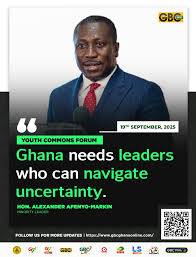Alexander Kwamena Afenyo-Markin, Ghana’s Minority Leader in Parliament, has issued an impassioned call to the youth of the country: to reject corruption in all its forms, resist attempts to divide communities, and demand accountability from leaders at every level. His message, delivered in several fora—including universities and public lectures—aims to shift the political culture and empower young people to be agents of meaningful change.
In recent remarks at the University of Education, Winneba, during the Young Commons Forum, Afenyo-Markin warned that “pull-down politics”—a style of partisan hostility and destructive rhetoric—is threatening the foundations of Ghana’s democratic tradition. He urged students to ask themselves not just what political parties have done for them, but whether those in office have created actual opportunities: jobs, growth, and fair access.
Central to his message is a strong rejection of corruption. Afenyo-Markin has argued repeatedly that corruption is not simply a problem of individual politicians, but a broader societal challenge. At a public lecture on Constitution Day, he urged citizens, business people, civil society and the media to view corruption as a shared responsibility. He pointed out that cultural expectations—where leaders are pressured to give to chiefs, constituents or religious figures—can push officeholders into unethical behavior. Rejecting simple blame, he called for all stakeholders to act.
Another key theme is meritocracy and fairness. Afenyo-Markin has castigated the practice by which youth opportunities are allocated based on political loyalty rather than on talent, creativity or drive. Speaking at the Kwahu Business Forum, he insisted that Ghana’s future must be built on merit, not on partisan favouritism. Young people, according to him, deserve access to opportunity irrespective of which party they or their parents support.
Resisting division is also a core part of his appeal. Afenyo-Markin warns that political leaders sometimes stoke divides—tribal, regional, party-based—as an easy way to hold onto power. If unchecked, these tactics weaken the social fabric and undermine national unity. He tells youth to see past attempts to “us vs them” politics, to avoid being manipulated by slogans or identity, and instead to focus on shared aspirations—jobs, dignity, fairness.
Finally, he emphasizes accountability. It is not enough to care or to complain; young people must demand that promises are kept, misuse of public resources is exposed, and public institutions function fairly. He appeals for civil society and the media to “crack the whip” on the political class, but also to hold all actors—including business people, bureaucrats, and community leaders—answerable when wrongdoing occurs.
Why This Matters
Ghana is at a critical juncture. Youth unemployment remains high; economic opportunities are uneven; public trust in political institutions is wavering. In this context, Afenyo-Markin’s message is more than political rhetoric—it is a call to reshape the relationship between citizens and power. If Ghana’s young people heed this call, they could drive changes in governance, reduce corruption, strengthen unity, and hold leaders more accountable.
But turning words into action won’t be easy. It requires sustained civic education, independent institutions, transparency in government, and safe spaces for youth participation. It requires that corruption is punished, not ignored; that fairness becomes the norm, not the exception; that divisions are bridged. Afenyo-Markin’s message puts the responsibility in the hands of young Ghanaians. The question now is whether Ghana’s youth will rise to meet it.



No comments yet
Be the first to share your thoughts!